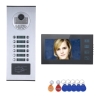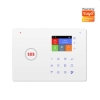How to Choose Alarm Systems?
What are Alarm Systems?
Alarm systems are an essential component of modern security, designed to detect and alert about potential intrusion, unauthorized access, or hazardous situations. Utilizing a combination of manual and automatic components, alarm systems can help protect homes, businesses, and other premises from various threats - including burglary, fire, and gas leaks.
Features of Alarm Systems
There are multiple features that make alarm systems effective in providing security for various applications:
Sensors and Detectors: Alarm systems are equipped with various types of sensors and detectors to identify specific threats, such as motion sensors, glass break sensors, smoke detectors, and gas leak detectors. These devices detect changes in the environment and trigger the alarm system when a threat is identified.
Control Panels: A control panel is the central unit of an alarm system that receives information from sensors and detectors, processes the data, and triggers appropriate responses, such as sending notifications to the concerned parties or activating sirens or alarms.
Monitoring Services: Many alarm systems include 24/7 monitoring services. In the case of an emergency, a monitoring center is promptly notified, and appropriate actions, such as contacting emergency services, can be taken.
Remote Access: Modern alarm systems allow users to control and monitor their security systems using smartphones or other devices. This feature provides real-time access to security information and enables prompt decisions in case of emergencies.
Application of Alarm Systems
Alarm systems can be applied in various settings to ensure the safety of people, property, and assets. Some common applications include:
Home Security: Residential alarm systems can include intrusion detection, fire alarms, and carbon monoxide detectors. They can also be equipped with video surveillance and home automation systems to improve overall security.
Business and Commercial Security: Alarm systems for businesses and commercial properties can comprise intrusion detection, access control, video surveillance, and fire alarm systems.
Industrial Security: In industrial environments, alarm systems can monitor hazardous materials, detect gas leaks, and provide fire and security alarms, offering protection for employees and equipment.
Public Spaces: Alarm systems can also be applied to public spaces, such as parks, stadiums, and transportation hubs, ensuring a safe environment for patrons and staff.
Why Are Alarm Systems So Important?
Alarm systems play a pivotal role in ensuring the safety and peace of mind of individuals and communities. Some reasons for their importance include:
Protection of Property: Alarm systems help safeguard property from intruders, vandals, and other potential threats, reducing the risk of theft, damage, or loss.
Prevention of Life-Threatening Incidents: Alarm systems equipped with fire and gas detectors can detect hazardous situations in real-time, enabling prompt evacuation or emergency response, potentially saving lives and preventing injuries.
Reduction in Response Time: By immediately notifying the monitoring centers or emergency services, alarm systems help reduce response time in critical situations, increasing the chances of a favorable outcome.
Deterrent Effect: The mere presence of an alarm system can discourage potential intruders, making them less likely to target a property.
How to Maintain Alarm Systems
Regular Inspection and Testing
Inspecting and testing your alarm system regularly allows you to detect any malfunctions early, ensuring that your system remains efficient. This process usually involves:
Testing the batteries.
Examining sensors for damage.
Testing alert mechanisms such as sirens, lights, and vibration alerts.
Make sure to perform these tests at least once a month.
Keep Sensors Clean and Clear
Alarm system sensors can become less efficient when covered in dirt, dust, or debris. Routinely clean your sensors with a dry cloth or a small vacuum cleaner to ensure they function at their best. Also, ensure there are no obstacles obstructing these sensors, as they require a clear line of sight.
Replace Batteries Regularly
A powerless alarm system is as good as no alarm system at all. Replace batteries according to the manufacturer's recommended schedule. It's advisable to have an extra set of batteries on hand in case of sudden power outages.
Update Software
Make sure your alarm system’s software receives regular updates, especially if it's a smart security system. Updating ensures your alarm system remains compatible with new features, system upgrades, and security patches.
Maintain Wiring and Connections
Wires and connections are susceptible to wear and tear, corrosion, or even tampering. Regularly inspect these components and replace any damaged parts promptly. For wireless alarm systems, check that your devices have a strong and stable connection to avoid false alarms or loss of signal.
Seek Professional Assistance
Enlist the help of an alarm systems expert or the security company handling your alarm system for an annual inspection or if you identify any issues you are unable to resolve. Regular professional maintenance can prolong the life of your alarm system and spot potential problems before they escalate.
Sales and Prices of Different Types of Alarm Systems
Wired Alarm Systems
Wired alarm systems are a traditional choice for home and business owners. They rely on a physical network of sensors and alarms connected through wires to a central control panel.
Sales: Over the past decade, the sales of wired alarm systems have gradually declined due to the increased popularity of wireless alternatives. However, many people still opt for wired systems due to their reliability in terms of connectivity.
Pricing: Wired alarm systems are generally more affordable than their wireless counterparts, starting from 100for basic systems and going up to 500 for more advanced options.
Wireless Alarm Systems
Wireless alarm systems are becoming increasingly popular due to their ease of installation and flexibility. They rely on radio frequency technology to communicate between sensors, alarms, and the control panel.
Sales: The sales of wireless alarm systems have outpaced wired systems in recent years, demonstrating a growing preference among consumers. This trend is likely to continue in the coming years as technology advances and wireless systems become even more sophisticated.
Pricing: Wireless alarm systems can range from 200 to over 1,000, depending on the features offered and the number of components included.
Smart Alarm Systems
Smart alarm systems are the new generation of security systems that integrate seamlessly with smart home technology. They can be controlled remotely via mobile apps, and offer a range of features such as live video feed, two-way audio communication, and real-time alerts.
Sales: As smart home technology becomes more accessible, the sales of smart alarm systems have grown rapidly. Their popularity is expected to increase as they continue to offer innovative features, catering to diverse security needs.
Pricing: The prices of smart alarm systems vary according to their features and integration capabilities. Basic systems start at around 300 while more advanced systems can cost over 1,500.
All-in-One Alarm Systems
All-in-one (AIO) alarm systems are designed to provide comprehensive security services in a single package. They typically include multiple sensors, an alarm, a control panel, and even a surveillance camera.
Sales: Although relatively new in the market, all-in-one alarm systems are quickly gaining traction due to their cost-effectiveness and streamlined user experience.
Pricing: The prices of all-in-one alarm systems may range from 250 to more than 700, depending on the features and components.
Alarm Systems Common Technical Troubleshooting FAQs
Q: Why won't my alarm system arm?
A: Check that all doors, windows, and sensors are closed and in the correct position. Also, ensure the system is powered on and you have entered the correct arming code on the keypad.
Q: Why is my alarm system beeping?
A: Beeping or chirping can indicate a low battery, power failure, or malfunctioning sensor. Replace any low batteries, verify power supply is stable, or troubleshoot individual components.
Q: How do I reset my alarm system after a false alarm?
A: Enter your disarm code on the keypad or use your key fob to reset the system. If necessary, contact your security company for further assistance.
Q: How do I change my alarm system's battery?
A: First, refer to the system's user manual for specific instructions. Generally, disconnect the AC power, open the control panel, and replace the battery. Reconnect the AC power afterward.
Q: Why is my motion sensor causing false alarms?
A: False alarms can be caused by improper installation, pets, insects, or environmental factors. Adjust sensor sensitivity settings, change sensor locations, or consult with a professional installer.
Suppliers of Alarm Systems
If you want to buy Alarm systems, or have questions about the types of Alarm systems, please leave us a message. iBirdView is your best choice. As professionals in the surveillance system industry, we are steadfast in our commitment to providing efficient, reliable, scalable and seamlessly integrated solutions to meet the needs of our valued customers. Not only can we help you choose the Alarm systems that best suit your needs, we can also provide comprehensive after-sales services, whether it is about the operation, repair or maintenance of Alarm systems.
Welcome to contact us to get the latest price of new Alarm systems. Competitive price, reliable quality, waiting for you to buy!


